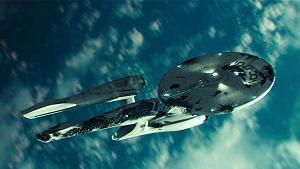 There are two layers to Star Trek Into Darkness. One exists at the surface level and involves everything that we see, hear, and experience while watching it in a theater, and the other involves the efforts that occurred below the line, prior to the film’s arrival at the multiplex. Just like its 2009 predecessor, the former layer proves to be the sequel’s saving grace and the latter holds it back from being truly great; the marriage between star-making, charismatic, invested performances and ham-handed, hackish screenwriting ultimately yields the same results J.J. Abrams got with his last venture into Gene Roddenberry’s beloved sci-fi iconography, a movie that works in the moment as blockbusting entertainment but collapses when given second thoughts.
There are two layers to Star Trek Into Darkness. One exists at the surface level and involves everything that we see, hear, and experience while watching it in a theater, and the other involves the efforts that occurred below the line, prior to the film’s arrival at the multiplex. Just like its 2009 predecessor, the former layer proves to be the sequel’s saving grace and the latter holds it back from being truly great; the marriage between star-making, charismatic, invested performances and ham-handed, hackish screenwriting ultimately yields the same results J.J. Abrams got with his last venture into Gene Roddenberry’s beloved sci-fi iconography, a movie that works in the moment as blockbusting entertainment but collapses when given second thoughts.
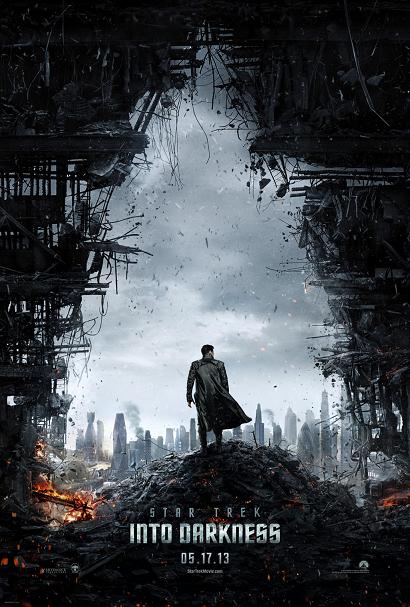 Except that this time that collapse may be even worse for Star Trek Into Darkness‘ health. It’s difficult, to say the least, to accuse the film of being a failure full-stop; it’s fun, in no small part because Abrams has shed the self-consciousness of his first contribution to the Star Trek series, and of course it’s incredibly well-acted. But it’s also weighed down by a dopey script slapped together by Damon Lindelof, Roberto Orci, and Alex Kurtzman, Hollywood’s three new favorite button men and maybe the most reviled- fairly or not- trio of writers working in the business today. In effect, that just makes Star Trek Into Darkness the quintessential summer movie, one that dazzles on the screen and boggles once the lights go up- it’s not a work that demands much thought on its audience’s behalf and instead seeks to simply excite us, and taken on that basis it’s a success.
Except that this time that collapse may be even worse for Star Trek Into Darkness‘ health. It’s difficult, to say the least, to accuse the film of being a failure full-stop; it’s fun, in no small part because Abrams has shed the self-consciousness of his first contribution to the Star Trek series, and of course it’s incredibly well-acted. But it’s also weighed down by a dopey script slapped together by Damon Lindelof, Roberto Orci, and Alex Kurtzman, Hollywood’s three new favorite button men and maybe the most reviled- fairly or not- trio of writers working in the business today. In effect, that just makes Star Trek Into Darkness the quintessential summer movie, one that dazzles on the screen and boggles once the lights go up- it’s not a work that demands much thought on its audience’s behalf and instead seeks to simply excite us, and taken on that basis it’s a success.
But it could have been more and that’s frustrating. This time around, we’re side by side with the crew of the USS Enterprise as they deal with terrorism in the space-faring age, though the tale starts off with a jaunt on an alien planet that results in Captain Kirk’s (Chris Pine) summary demotion. It doesn’t take long for him to get reinstated after a former member of Starfleet named John Harrison (Benedict Cumberbatch) blows up a building and kills scores of people in the process; who better to capture a rogue officer than the most roguish captain around? Of course, things aren’t quite so simple as they seem, and Harrison has a few tricks and truths hidden up his sleeve that throw the central quest for justice off the rails.
If you’ve been paying attention to Abrams’ mystery box for the last couple of years, then the identity of Cumberbatch’s character is likely an enormous point of contention. Speaking too much to that means an unbidden foray into spoiler territory, as the very nature of the villain actually poses a significant challenge in reviewing the film. (Note to Abrams: this is why the mystery box doesn’t work.) That’s because of how Orci, Kurtzman, and Lindelof- and, I suppose, Abrams, though he feels like the least culpable person behind the lens here- cannibalize elements from past Trek stories; they’ve created a checklist of references rather than a real, complete story.
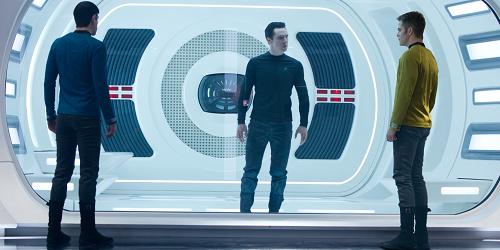
It’s reckless fan service, no more, no less. There’s room for fan service in fan-driven franchises like Star Trek, of course, and at times it can be a lot of fun for both the uninitiated and the diehards alike. But as with any idea employed in the service of crafting narrative, it should be applied carefully and with thought, and the absence of either presents a thorn in the film’s side. That’s not necessarily to say that Star Trek Into Darkness is a thoughtless film, mind, but rather to say that Roddenberry’s world has been re-envisioned with a shocking lack of consideration or foresight; reaching into established canon winds up creating more problems for the plot than can be reasonably solved in two hours (and by these writers, depending on who you ask). It doesn’t help that the film goes out of its way to undermine its own stakes and drama at every opportunity by turning incidence into mild inconvenience. Nothing bad that happens here matters.
So Star Trek Into Darkness falls into the same category of “special” as Star Trek ’09, and that’s not necessarily a bad thing- it’s a fun picture. It’s just not a totally fulfilling one, and for a number of obsessive Trek fans it’s likely going to feel like an insult at best and a declaration of war on their sub-culture at worst. (Though conversely, a number of other obsessive Trek fans will love it, meaning that sci-fi conventions will continue to exist as volatile powder kegs of split fan interests.) For everyone else, the callbacks here are probably going to be meaningless, and arguably Star Trek Into Darkness exists as much for them as for the Trekkie crowd. What may matter most here is how good the cast looks, and, well, they look really damn good.
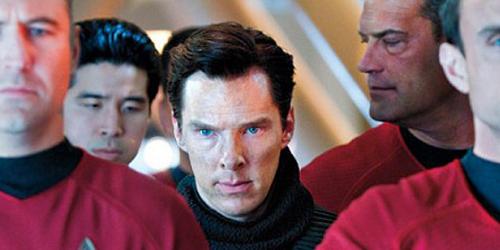
That, incidentally, should satisfy the fans, too. Pine proved himself as a worthy Shatner successor four years ago, and does so again here, but here it’s Zachary Quinto’s attempts at mimicking Leonard Nimoy that impress the most. He sinks into the role, replicating the ticks and quirks of Nimoy’s characterization while managing to put his stamp on Spock all at the same time; he walks the tightrope of determined coldness and human emotion perfectly. Star Trek Into Darkness revolves so much around the camaraderie between both men that almost everyone else gets shortchanged (or, in Zoe Saldana’s and Karl Urban’s cases, outright robbed), but they make the most of what they’re given- particularly Simon Pegg, who actually gets to pull of some thrilling heroics as Scotty instead of fret about warp cores and dilithium nonsense.
G-S-T Ruling:
Abrams, too, deserves a good bit of praise for shooting in 3D and making it look lovely. Star Trek Into Darkness is a beautiful film, one that manages to take good advantage of the format beyond mere gimmickry. (Though there is that, so be prepared to have stuff fly at you from off the screen. Like javelins.) It’s also frequently exhilarating while being substantively starved. Stuck in the middle of its better and worse merits, Star Trek Into Darkness works extremely well as performance-centric popcorn fluff- it just doesn’t demand much thought once you’ve left the theater.
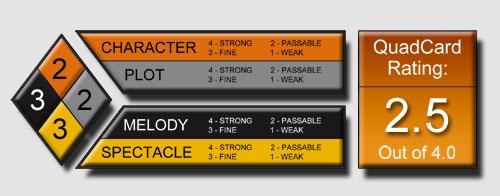
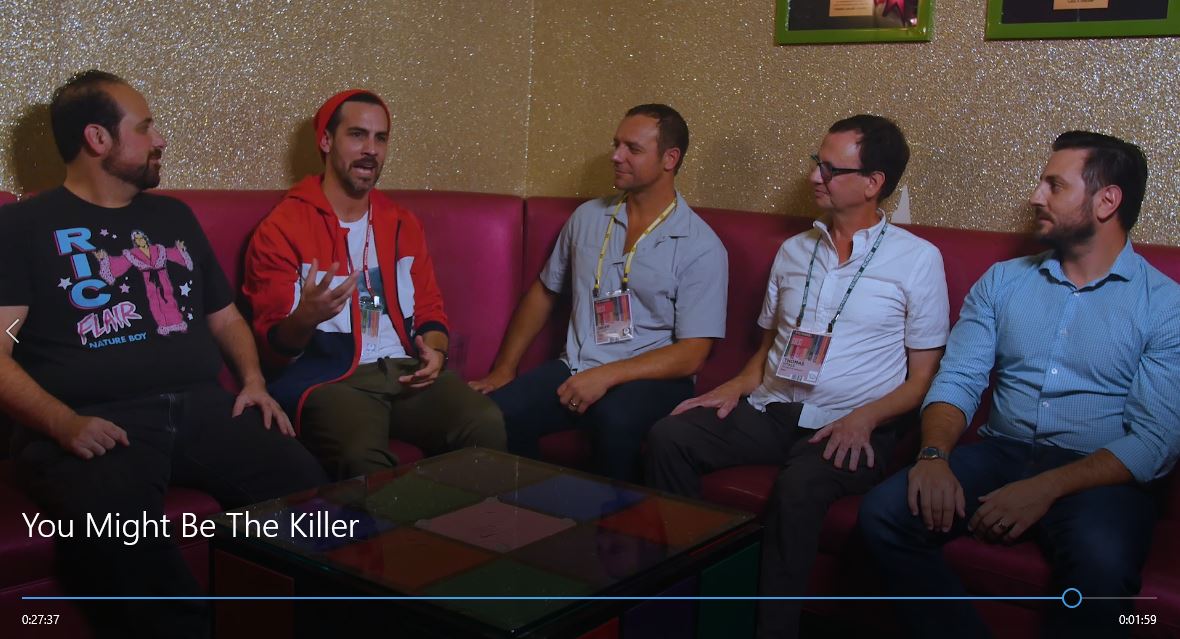
8 Comments
Dan O'Neill
Good review Andrew. Never misses a beat and never seems to lose it’s excitement, even if it just a scene of two people talking about god knows what.
Andrew Crump
If it loses anything, it loses it after the credits start rolling. But it’s not an outright crime in blockbusting like, say, Battleship.
Colin Biggs
I’m waiting to see this until my girlfriend comes back from overseas, this review makes the wait a little easier.
Andrew Crump
It’s an enjoyable theater experience. It just didn’t hold up well for me once I left. Positives: Zachary Quinto. He should be in everything ever, and I kind of want the series to continue just so he can keep playing Spock. He’s magnificent.
Colin Biggs
Did you take in the IMAX version?
Andrew Crump
Nah, just regular-old 3D.
Dan Fogarty
It doesn’t demand ANY thought once you leave the theatre, LOL. I found more entertainment value in it than you though, I think. Though you’re 100% right on the fan service thing… it certainly was a little out of hand at times. Glaring. 🙁
Good review Andy. 😉
Andrew Crump
Glad I’m not the only one who feels that way, Dan. I definitely had a good time with it while watching it, but thinking about it afterward kind of drove me batty.